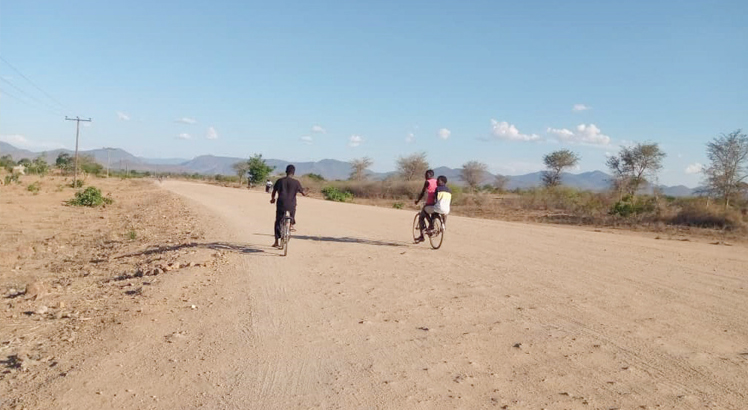Stalled road projects, broken hopes
Ambitious road projects have been strewn in all the country’s three regions. These are important roads that would not only change the lives of people in the areas, but also make a contribution to the country’s development through commerce, agriculture and other areas. Yet, some of the projects stalled. Others didn’t go far beyond the laying of foundation stones. Our Staff Writer, Ayami Mkwanda travels wide and broad to check progress on the projects that are seemingly white elephants. He writes:
In August 2018 former president Peter Mutharika launched the Rumphi-Bolero-Nyika- Nthalire Road, raising hopes of many people in Rumphi and Chitipa districts of easy mobility.
The project was scheduled to be completed in 2020, but four years later, no contractor is on the site.
Yet, the 270-kilometre (km) road is a shorter route from Rumphi Boma to Nthalire in Chitipa, instead of using the M1 that passes through Karonga to Chitipa Boma and further to Nthalire in Chitipa South.
The delay to upgrade the road to bitumen standards has affected people of the two districts who are forced to dig deeper into their pockets to pay for transport.

Dexter Nyasulu, a trader at Chikwawa in Lukungilo Village, Traditional Authority (T/A) Chikulamayembe, says if completed, the road will create bigger trading centres all the way to Nthalire.
He explains: “I sell a number of items such as soap, drinks and so much more we order from Tunduma in Tanzania. To get to Tunduma, we use the M1 Road, which is expensive.
“This road, on the other hand, is a shortcut to the border through Chitipa.”
Nyasulu says businesspeople will also easily access markets in Chitipa where they buy livestock, beans and other farm produce.
On her part, Lexa Mvalo Kalonde from the same area thinks the road will spur tourism activities at Nyika National Park.
“The poor road network discourages tourists from visiting the beautiful park. Let authorities upgrade the road to motivate more tourists,” she explains.
Acting Paramount Chief Chikulamayembe Hunga Gondwe said the road is not only important for people of Rumphi, but also Chitipa.
“Chitipa is the breadbasket of the Northern Region. The people grow crops such as bananas, beans, maize groundnuts. They have to travel through Karonga on their way to Mzuzu to sell their produce,” he said.
Chikulamayembe also argues that the road will connect people of the two districts to the international markets in Zambia and Tanzania.
Besides Rumphi-Bolero – Nyika-Nthalire Road, the people in Rumphi have another road to worry about, the Njakwa- Livingstonia Road.
However, unlike the Rumphi- Bolero-Nyika-Nthalire Road, the 78.5km Njakwa-Livingstonia Road Project is almost completed.
The project, which started in 2016, was scheduled to be completed in 2020 but now a 12-km stretch from Njakwa in Rumphi to T/A Mwahenga is yet to be completed.
Chief Mwahenga is not happy with the delay and calls on government to expedite the project.
“These modern times, not the era of Dr. Robert Laws [who founded Livingstonia Mission in 1894] and it is important to have modern roads to facilitate people’s movement from Livingstonia to Rumphi and other areas,” he explains.
Situation elsewhere
Rumphi and Chitipa are not the only districts where road projects stalled.
Communities in Nkhotakota District are equally concerned with the delay to complete 33km Msulira-Nkhufi-Nkhotakota Road whose deadline was in 2020.
This is a project the country’s Vice-President Saulos Chilima inspected in January 2021.
In December 2021, T/A Kalimanjira asked Chilima when he toured rehabilitation works on the M5 to find out why the project stalled.
“We appeal to the Tonse Alliance administration to consider rehabilitating it,” he said.
Another stalled project that has irked people is the 62.5km Lirangwe-Zomba-Machinga Road from Blantyre to Chingale Turn-off on the Zomba-Liwonde Road.
Launched in 2015, the project has missed several deadlines until the incumbent President Lazarus Chakwera launched the project again in 2021.
Sub-T/A Nkapita of Chingale in Zomba is worried that the project is not making progress.
“My subjects face mobility challenges, especially during the rainy season,” he says.
In 2019 the Ministry of Transport and Public Works launched the 18km Monkey Bay- Cape Maclear Road in Mangochi, but just like other projects, the works are yet to take off.
Chief Nankumba, speaking during the launch of the project, was optimistic that people, especially those involved in fishing, would cut transport cost once the project is completed.
But to his amazement, no contractor is on the project’s site.
Interestingly, in October last year, Deputy Minister of Roads and Public Works Nancy Chaola Mdooko pledged that the Tonse Alliance will start construction works, saying it would be completed in nine months.
But when Weekend Investigates visited the road last week, there was no contractor on the site.
Further south, in Chikwawa District, community members continue to wait for the completion of the 60km Thabwa-Fatima Road, which missed its deadline in 2020.
The project was launched in 2018 but today there is no tar on the road. When completed, the road will connect Chikwawa and Nsanje districts at Makhanga [Nsanje] via the Shire River’s East Bank.
However, only a 20km stretch from Thabwa on the M1 to Mitondo Trading Centre in Chikwawa East was upgraded.
Chief Makhuwira of Chikwawa says the East Bank is known for agricultural and fishing activities, which need a good road network to ease the transportation of the commodities to markets.
The 45km Chiringa-Muloza Road is another project that stalled after its launch in 2019. The road starts from Chiringa in Phalombe South East, skirting Michesi Mountain in Phalombe and Mulanje Mountain in the east to join Muloza-Mulanje Road.
Chikondano Yakobo from group village head Msikita, T/A Njema says his hopes were raised when he the road was being graded last year.
“But no sooner had the contractor started the work than he disappeared. We don’t know when construction works will resume,” he says.
What went wrong?
The million-dollar question is why many road projects stalled after government struck deals with contractors and funders were identified.
According to Roads Authority (RA) spokesperson Portia Kajanga, the projects stalled due to a number of reasons, including lack of funding and capacity on the part of contractors.
On the Rumphi-Bolero-Chitipa Road, she says due to budgetary constraints, the first phase was to cover 20km from Bolero to Thazima Gate.
Kajanga explains: “However, due to contractual breach, the Malawi Government terminated the civil works contract in February 2021.
“Procurement of a contractor to complete the remaining works [on this initial 20km section] is at an advanced stage and it is expected that works may start before the end of the financial year.”
S h e s a i d i n a d d i t i o n , procurement of the design services consultant to design the entire road from Bwengu in Mzimba through Rumphi Boma to Chitipa is also at an advanced stage.
Njakwa-Livingstonia Road
According to Kajanga, the project faced funding challenges when it was started in 2016. The government later sorted out the bottlenecks. The current delays are due to the contractor’s capacity challenges and he is yet to provide a realistic time frame of when the remaining works will be completed.
Msulira-Nkhufi-Nkhotakota Road
J u s t l i ke the Njakwa- Livingstonia Road, the project faced funding challenges in 2019 which government resolved later.
“However, progress remained very minimal due to contractor’s capaci ty chal lenges. The government terminated the contract in June 2021 due to some contractual breaches by the contractor. The remaining works will be re-packaged and another contractor will be identified to complete the works,” explains Kajanga.
Thabwa-Fatima Road
The initial project of this road was funded by the World Bank to construct six bridges and rehabilitate 33km of the road from earth to gravel standard.
“Currently, procurement of a contractor to upgrade the road to bitumen standard is at an advanced stage and it is expected that the contractor will be on the ground before the end of the financial year. Upgrading of the road will be done in two phases,” says Kajanga.
Monkey-Bay-Cape Maclear Road
The authority explains that the contract for this road was struck in June 2020, but commencement of the works was suspended as there was no budgetary provision in the 2020/21 financial year.
Funding was later provided in the 2021/22 financial year and works are in progress, according to the RA.
Lirangwe-Zomba-Machinga Road
Works for the first phase of this 62km road started in April 2018 and were supposed to be completed in December 2020. Phase 1 was to cover the first 19km between Lirangwe and Chipini.
But according to the authority, due to contractual breach by the contractor, the contract was terminated in February 2021.
“Procurement of another contractor to complete the remaining works is at an advanced stage and it is expected that works may start before the end of the financial year,” says the authority.
Chiringa-Muloza Road
“The contract for construction of the initial 20km of this 45km road started in April 2019, and were to be completed in March 2021, but the contract was terminated in June 2021 due to breach of contract by contractor,” says Kajanga.
She explains that the works are being re-packaged and procurement of a contractor to complete the works will start soon.
Blame politics?
According to Parliamentary Committee on Transport and Public Works chairperson Uchizi Mkandawire governing parties are forced to initiate road projects across all regions ‘just for the sake of balancing development, even if there are no resources’.
“As a result, we are not able to pay the contractors on time and we end up paying them billions in arrears and high interests,” he explains.
A political analyst based at the University of Malawi, Ernest Thindwa agrees with Mkandawire’s sentiments, saying it is not uncommon for administrations to launch projects purely for campaign purposes.
He opines that such activities are meant to promote government visibility in concerned areas with the view to enhance chances of winning during elections.
Explains Thindwa: “Often such projects are not meant to be implemented, but are electoral tools as the incumbent administration would want to be seen to be delivering.
“Once elections are gone, such projects do not go beyond the laying of the foundation stone.”
Any implications?
Thindwa argues that failure to implement projects has far-reaching consequences.
“The tendency by the political class to launch projects which are rarely completed is no longer sustainable. The Malawian citizenry has increasingly become acutely aware of the collective entitlements, more demanding and want to be more involved in shaping their shared destiny,” he explains.
The political analyst advises the Chakwera administration to be realistic and strategic with development projects by targeting high impact sectors and prioritise projects which can optimise the collective gain of people.
The ministry recently developed a 20-year National Transport Master Plan to guide the sustainable development of an integrated multi-modal transport sector.
Hopefully, this will guide government to ensure that projects are completed within their time frame.
Next week
We will look at how new roads have opened opportunities to people in hard-to-reach areas by cutting transport costs and easing mobility challenges.






One Comment